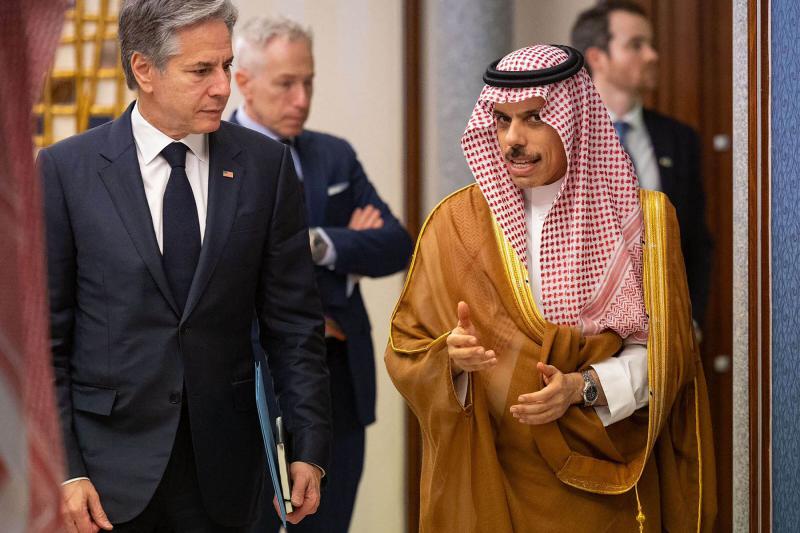WASHINGTON/ RIYADH
Discussion of the security pact between the United States and Saudi Arabia is said to be in its final stages amid the likelihood that this bilateral agreement, once finalised, will be uncoupled from the regional “Grand Bargain”, which is supposed to include Saudi normalisation with Israel.
Now there is a clearer timeline for a finalisation of the agreement between Riyadh and Washington as US Secretary of State Antony Blinken declared last Wednesday, saying the United States and Saudi Arabia were “weeks away” from concluding a package of agreements on nuclear energy, security and defence cooperation.
Blinken made his assessment before Congress following the Middle East visit by White House National Security Adviser Jake Sullivan, who held talks with Saudi Crown Prince Mohammed bin Salman and Israeli Prime Minister Binyamin Netanyahu.
The regional deal, which is supposed to change the face of the Middle East, remains elusive largely because of Netanyahu’s repeated rejection of any plans for the creation of a Palestinian state as demanded by Riyadh.
“Saudi Arabia has made very clear that even with the agreements between us completed, they have to have two things: they have to have calm in Gaza and they have to have a credible pathway to a Palestinian state,” said Blinken.
US President Joe Biden’s aides had originally envisioned, during three-way negotiations before the October 7 Hamas attack, Saudis securing US security commitments and US nuclear cooperation in exchange for normalising ties with Israel.
But now the administration is negotiating with Riyadh on a separate track leaving Netanyahu to eventually decide whether to join a regional arrangement. It is mindful however that the Israeli premier’s main focus is to keep Israel’s most right-wing government ever from collapsing by continuing his war in Gaza, even if it means foregoing normalisation with Riyadh.
Biden’s team sees a lot to gain from Saudi-Israeli normalisation in terms of political dividends on the eve of the November elections. But even without the normalisation aspect, a pact with Riyadh will provide Washington with enough selling points to ensure US Senate approval because the bilateral deal would mean containing Iran’s ambitions and curtailing Chinese and Russian influence in Saudi Arabia and the Middle East.
The Guardian was the first to float the notion of a ‘Plan B’, that is a Saudi-US deal that does not hinge on normalisation with the Jewish state.
“There should be room for a less-for-less model, so the relationship with the US need not be held hostage to the whims of Israeli politics or Binyamin Netanyahu,” said Firas Maksad, senior director for strategic outreach at the Middle East Institute.
Keeping normalisation outside the deal with the US, at least for now, would also allow Riyadh to avoid the domestic and regional blowback considering the tensions fuelled by the war in Gaza.
“At this stage, it looks like a long shot,” said Ali Shihabi, a Saudi analyst close to the government told The New York Times about a normalisation deal.
The security accord would call for formal US guarantees to defend the kingdom as well as Saudi access to more advanced US weaponry, in return for halting Chinese arms purchases and restricting Beijing’s investment in the country.
Saudi Arabia also wants US assistance and technology to develop its own nuclear energy programme.
Blinken said Washington wanted any civil nuclear deal to include the kingdom agreeing to the “gold standard” of foregoing uranium enrichment or reprocessing spent fuel as well as the “Additional Protocol” that gives the UN nuclear agency more verification tools. However, he did not commit on whether a Saudi deal would include either.
Negotiators have also been discussing US sales of advanced F-35 fighter jets Riyadh as part of the deal as well as Saudi access to artificial intelligence and other advanced technologies.
Karen Young, a senior research scholar at Columbia University’s Center on Global Energy Policy, believes the nuclear programme was the “No. 1 priority” for Prince Mohammed.
For Saudi Arabia, she said, “it’s always been a bilateral deal; it’s not a trilateral one.”
“Israel is so peripheral,” she added, “which is beyond ironic.”
As Washington works on restoring “calm” in Gaza through a hostage deal that would achieve a limited ceasefire, the moment of choice was approaching for Israel, recently noted the US chief diplomat.
“Until now this has been a hypothetical or theoretical question for Israel. Assuming we complete the agreements between the United States and Saudi Arabia, that hypothetical or theoretical question becomes a real question that they will have to answer one way or another,” added Blinken.


